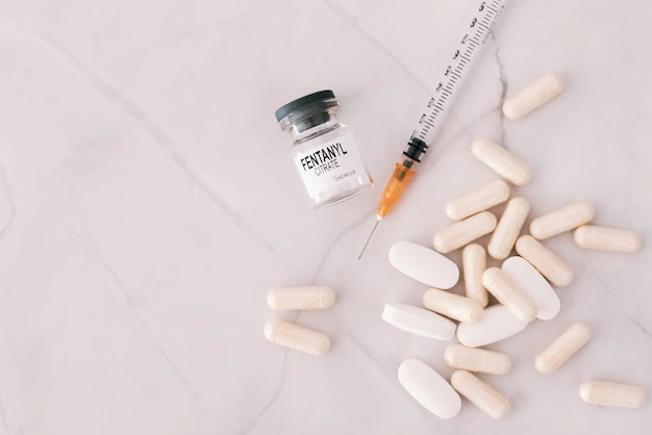About two-thirds of the over 108,000 drug overdose fatalities in 2021 featured fentanyl or another synthetic opioid. In 2020, almost 43,000 overdose deaths were from fentanyl. This synthetic opioid is commonly used for managing pain in cancer patients and those who have undergone surgery or cannot tolerate other types of pain medication. Unfortunately, the dangers of fentanyl are numerous and well-documented at this point. The drug has been linked to countless deaths over recent years. Public health organizations have issued warnings about its use as an anesthetic, painkiller, and even a street drug. As an illicit substance, these organizations are seeing this as an issue of national security and appealing Washington to bring immediate attention before any more people die. But what exactly is fentanyl? How do you recognize it, and what are some things you need to know if you think someone around you might be using it? Keep reading to find out more!
What Is Fentanyl?
Fentanyl is a synthetic opioid analgesic (an opioid drug that can reduce pain and induce feelings of relaxation, pleasure, and calmness) used as an anesthetic in surgical settings to relieve pain and can be used to treat chronic pain. It is a prescription drug that doctors prescribe to manage pain, and it comes in tablet, patch, and lozenge forms. Fentanyl is also used to manage breakthrough pain in cancer patients who are already prescribed opioids to manage their pain. Fentanyl is around 100 times stronger than morphine and 50 times stronger than heroin. It is so strong that doctors recommend using the minimum dosage possible to manage pain, especially in cancer patients. The risk of overdose is very high as a small error in dosage, or even a tiny miscalculation, can have serious repercussions.
Dangers of Fentanyl
There are many dangers associated with fentanyl, including fatal overdoses, cancer, heart problems, and addiction.
- Fatal Overdoses - People who overdose on fentanyl may not realize they are taking too much of the drug or if they are taking fentanyl at all. This unawareness can lead to accidental overdose and even death.
- Cancer - While fentanyl is an opioid, it can also promote the growth of cancer cells. This occurrence is hazardous when fentanyl is applied as a patch or tablet, as it leaves a highly concentrated amount of fentanyl in one area for an extended time.
- Heart Problems - In addition to promoting the growth of cancer cells, fentanyl can also lead to heart problems, which is why fentanyl is usually prescribed along with another heart medication.
- Opioid use disorder - Anyone who regularly takes fentanyl is at risk of dependence on the drug. This dependence could quickly become an addiction if a person continues to take the substance despite adverse consequences in their life due to their use.
Why Is Fentanyl So Dangerous?
There are a few different reasons why fentanyl is so dangerous. First, it is a synthetic drug that is produced in a lab. While synthetic drugs are often used to treat illnesses, they can also be very dangerous. When taken as prescribed, synthetic drugs can be highly effective, but they can also be tough to regulate, leading to dangerous overdoses. Second, fentanyl is a potent drug that only needs to be used in a small amount. The reason is that the strength of the medicine is so high. This means that doctors must prescribe minimal doses of fentanyl to avoid overdoses, and people who abuse fentanyl will need to use even less. Not being mindful of dosing makes it very easy to overdose, as even a tiny mistake could lead to death.
What Are the Signs that Someone Might Be Using Fentanyl?
If you suspect a friend or loved one might abuse fentanyl, there are some warning signs to look out for. Here are some common symptoms of abuse and side effects of fentanyl user:
- Abusing prescription medications - You might notice someone using fentanyl by seeing them abusing or misusing prescription medications. This behavior could be in the form of stealing medicines from friends or family, forging prescriptions, or buying prescription medications they do not use.
- Appearing drowsy or tired - Someone abusing fentanyl may always appear tired during the day. If a friend or family member is always sleepy, even during active waking hours, they may be using fentanyl.
- Gastrointestinal problems - Abusing fentanyl can lead to nausea and gastrointestinal issues, like vomiting and diarrhea. If a person has been using fentanyl, you may notice that they are having these problems.
- Bloodshot eyes - This is a common sign of drug abuse. Bloodshot eyes could be a sign of fentanyl abuse.
- Track marks - People who inject fentanyl will have track marks on their arms where they inject themselves.
- Out-of-character behavior - If a friend or family member abuses fentanyl, you may notice that they are acting out of character.
Final Thoughts
If you think someone around you is abusing fentanyl, you should always seek help. You can talk to a friend or loved one and let them know you care and want to help them through this. You can also contact the Substance Abuse and Mental Health Services Administration (SAMHSA) or call their helpline at 1-800-662-HELP to find local resources or assistance. Wish Recovery is committed to delivering compassionate, comprehensive, luxury detox and rehabilitative support and services for opioid use disorder, many other substance use disorders, and dual diagnoses. You can contact us anytime to find out about treatment options and to verify insurance.


